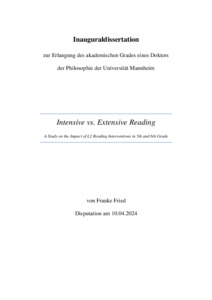|
Intensive vs. extensive reading: a study on the impact of L2 reading interventions in 5th and 6th grade
Fried, Frauke
![[img]](https://madoc.bib.uni-mannheim.de/67210/1.hassmallThumbnailVersion/Dissertation_FraukeFried_final.pdf)  Vorschau |
|
PDF
Dissertation_FraukeFried_final.pdf
- Veröffentlichte Version
Download (9MB)
|
|
URN:
|
urn:nbn:de:bsz:180-madoc-672107
|
|
Dokumenttyp:
|
Dissertation
|
|
Erscheinungsjahr:
|
2024
|
|
Ort der Veröffentlichung:
|
Mannheim
|
|
Hochschule:
|
Universität Mannheim
|
|
Gutachter:
|
Tracy, Rosemarie
|
|
Datum der mündl. Prüfung:
|
10 April 2024
|
|
Sprache der Veröffentlichung:
|
Englisch
|
|
Einrichtung:
|
Philosophische Fakultät > Anglistik I - Anglistische Linguistik (Tracy 1995-2019)
|
|
Fachgebiet:
|
420 Englisch
|
|
Freie Schlagwörter (Englisch):
|
extensive reading , intensive reading , english reading interventions , self-concept , goal orientation
|
|
Abstract:
|
Extensive reading has proven to have various positive effects on students’ language competence in the L1. Therefore, L2 teachers are also encouraged to practice extensive reading with their students to develop their L2. Yet, studies focusing on extensive L2 reading are relatively scarce and mainly conducted in the Asian area. Moreover, literature on extensive reading sometimes creates the impression that intensive and extensive reading is an either / or issue, sometimes propagating extensive reading to be more effective. This longitudinal, experimental study analyzes what effects intensive and extensive English reading interventions have on German 5th and 6th grade students’ English abilities (measured with reading comprehensions tests, cloze tests and prepositions tests) and on their goal orientation and self-beliefs concerning the school subject English. This study did not find any direct effects of the intervention type on improvement in the language tests, but on goal orientation and self-concept: Extensive reading interventions had a positive impact on students’ criterial self-concept, but also on their work avoidance, whereas intensive reading had a negative impact on students’ criterial self-concept, but a positive impact on their work avoidance. Moreover, students with a high initial language competence, high L1 reading experience, low learning goal orientation and/or low criterial self-concept profit more from intensive reading interventions and students with a low initial language competence, low L1 reading experience, high learning goal orientation and/or high criterial self-concept from extensive reading interventions. This study therefore shows that intensive and extensive reading is not an either / or issue, but a matter of what fits whom.
|
 | Dieser Eintrag ist Teil der Universitätsbibliographie. |
 | Das Dokument wird vom Publikationsserver der Universitätsbibliothek Mannheim bereitgestellt. |
 Suche Autoren in Suche Autoren in
Sie haben einen Fehler gefunden? Teilen Sie uns Ihren Korrekturwunsch bitte hier mit: E-Mail
Actions (login required)
 |
Eintrag anzeigen |
|
|
